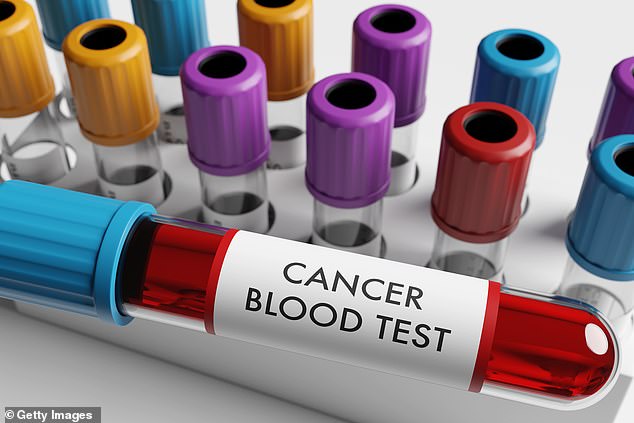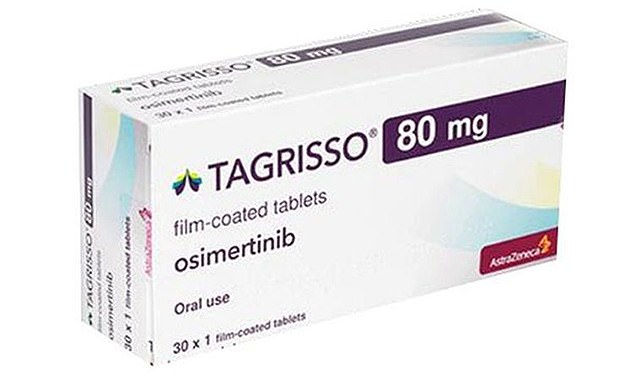A every day tablet to deal with the deadliest lung tumours, ‘good bomb’ medication that cease blood most cancers in its tracks and a jab so potent it may considerably slash the worldwide demise toll from pores and skin most cancers.
These had been simply among the breakthroughs reported on the annual assembly of the American Society of Medical Oncology (ASCO) in Chicago final week.
Hundreds of the world’s high most cancers clinicians gathered to listen to how science is gaining floor within the battle towards a illness which nonetheless kills about 167,000 folks annually within the UK.
And it is no exaggeration to say that among the advances unveiled are probably among the many most important we now have ever seen.
As one of many reporters overlaying the occasion, I heard gasps from viewers members as researchers unveiled findings that promise to slash deaths from types of the illness that had been, till pretty not too long ago, thought of a demise sentence.

Among the many new therapies is a ‘smart-bomb’ drug which seeks and destroys most cancers cells can lengthen the lives of sufferers with incurable blood most cancers
It is truthful to say some outcomes had been past everybody’s expectations, together with these doing the research.
Higher nonetheless, most of the findings apply to medication and coverings that might be making a distinction to most cancers sufferers’ lives in a matter of months, not years.
Others could also be additional down the road however nonetheless provide hope that most cancers – at the least most types of it – will someday be not more than a illness that impacts folks’s lives however will not shorten them.
In pole place is a complete new technology of vaccines, custom-made to cease cancers returning. And one of many highlights from Chicago was the information that 1000’s of NHS sufferers will get personalised most cancers jabs over the subsequent yr as a part of a significant push by the NHS to enrol Britons in dozens of vaccine trials.
‘These vaccines are essentially the most promising I’ve seen,’ stated Dr Julie Gralow, one of the crucial senior most cancers consultants within the US and ASCO’s chief medical officer.
She added that it might be a number of years earlier than docs are capable of routinely use them on the entrance line, however ‘there’s a bunch of sensible stuff which may change affected person care tomorrow’.
So what are the important thing take-home developments – away from the headlines – that, as The Mail on Sunday’s Well being Editor, I feel you’ll want to learn about?
Learn on to seek out out…
Pores and skin most cancers medication work higher earlier than surgical procedure
Giving sufferers with aggressive melanoma pores and skin most cancers immune-boosting medication earlier than they endure surgical procedure considerably reduces the danger of the illness returning.
The impact was so pronounced that the majority sufferers who acquired immunotherapy earlier than surgical procedure wanted solely two doses, in contrast with those that acquired the medication afterwards who wanted 12.
‘These outcomes are unprecedented,’ says Dr Lynn Schuchter, a melanoma knowledgeable on the College of Pennsylvania and ASCO president. ‘Sufferers at the moment obtain a complete yr of remedy after melanoma surgical procedure. However we now know that, for a lot of, simply two rounds of immunotherapy earlier than the process are sufficient.
‘After I return to my sufferers, I am going to have a brand new strategy on tips on how to deal with them.’
Melanoma impacts greater than 15,000 Britons yearly, and infrequently spreads to different elements of the physique. It’s the most dangerous kind of pores and skin most cancers, killing about 2,500 Britons yearly. It usually appears to be like like an oddly formed mole, normally black or brown in color.
At present, NHS docs will surgically take away the melanoma in addition to close by lymph nodes – bean-shaped buildings all through the physique that filter out dangerous substances equivalent to viruses. The lymph nodes are sometimes the primary place that melanoma spreads.
Following surgical procedure, sufferers normally get immunotherapy remedy – medication which prepare the physique to identify and destroy most cancers cells. But when melanoma has unfold into the lymph nodes, there’s a good likelihood the illness will return, with 50 per cent of this affected person group residing not than 5 years after prognosis.
On this new research, by the Netherlands Most cancers Institute in Amsterdam, greater than 200 sufferers had been both given two immunotherapy drug infusions – nivolumab and ipilimumab – twice over a six-week interval earlier than surgical procedure, or 12 occasions over a yr after surgical procedure.
When their lymph nodes had been eliminated, the tissue was examined for the presence of most cancers cells. If there have been indicators of the illness, then individuals acquired immunotherapy for one more yr.
Nonetheless, six out of ten had been cancer-free, that means they didn’t want additional remedy after surgical procedure.
Sufferers who acquired immunotherapy earlier than surgical procedure had been 45 per cent much less more likely to see their most cancers return inside a yr than those that acquired the medication afterwards.
Consultants consider this stark distinction is as a result of there are extra most cancers cells within the physique earlier than surgical procedure, which supplies the immune system extra alternatives to study to recognise the illness.
As soon as-a-day pill for lung most cancers
For my part, that is arguably one of the crucial vital most cancers breakthroughs in latest occasions – a every day tablet to deal with a very nasty kind of lung most cancers.
And I am not alone. When the findings had been introduced at ASCO, they acquired a standing ovation from different scientists.
About eight in ten lung most cancers sufferers within the UK have a type of the illness known as non-small cell lung most cancers. Of these, roughly 15 per cent carry what is called a genetic EGFR mutation, which raises the danger the physique will create irregular, cancerous cells, that means the illness is more likely to return no matter how it’s handled.
The brand new research, at Emory College in Atlanta, Georgia, gave 100 EGFR mutation sufferers with intensive lung tumours a every day pill known as osimertinib as soon as they’d accomplished chemo.
Osimertinib is designed to interrupt the EGFR gene’s protein manufacturing, stopping it from creating any extra most cancers cells.

The brand new research, at Emory College in Atlanta, Georgia, gave 100 EGFR mutation sufferers with intensive lung tumours a every day pill known as osimertinib as soon as they’d accomplished chemo
When the trial information was introduced, there have been audible gasps.
Sufferers carrying the EGFR mutation who got osimertinib had been 84 per cent much less more likely to die or see their most cancers develop, in contrast with those that acquired a placebo. On common, sufferers taking osimertinib didn’t die or see their most cancers progress for three-and-a-half years.
These not on the remedy usually died or noticed their illness unfold in lower than six months. Some trial individuals reside wholesome lives greater than seven years later (see panel under).
Osimertinib is already accessible on the NHS for sufferers with EGFR who’ve had profitable surgical procedure to take away lung most cancers, in addition to these with superior most cancers that has unfold all through the physique.
However consultants say there’s an unmet want for sufferers who’ve most cancers that has unfold all through the lungs, making it inconceivable to surgically take away, however has not moved into different organs but.
These so-called domestically superior sufferers make up 1 / 4 of all new lung most cancers circumstances within the UK. ‘This will probably be practice-changing for domestically superior sufferers,’ says Dr David Spigel, a lung most cancers knowledgeable on the Sarah Cannon Analysis Institute in Nashville, Tennessee.
Tumour-zapping immunity booster
There was extra excellent news on lung cancers – a brand new drug regime to deal with one of the crucial aggressive sorts, small cell lung most cancers, which impacts round 7,000 folks within the UK yearly and is normally attributable to smoking.
For sufferers within the early levels of the illness, when the most cancers has not but begun to unfold, remedy has remained largely unchanged because the Nineteen Eighties, with most receiving common doses of chemotherapy and radiotherapy.
Regardless of this, lower than a 3rd of sufferers will survive longer than 5 years after prognosis, because the most cancers spreads exterior of the lungs. However the brand new research discovered that providing an immune-boosting drug known as durvalumab extends their lives by slowing this unfold.
Durvalumab is a PD-L1 inhibitor, which helps the physique spot most cancers cells hiding from the immune system, permitting it to focus on and destroy them. It’s given as a month-to-month infusion after the affected person has had 12 weeks of chemotherapy and 6 weeks of radiotherapy. Three years after starting durvalumab, sufferers had been 25 per cent much less more likely to die in contrast with these on a placebo, shopping for them roughly two additional years.
Consultants stated that the 730-patient trial by the Sarah Cannon Analysis Institute might change how early-stage small cell lung most cancers is handled.
‘These are very encouraging occasions for lung most cancers sufferers,’ says Dr Suresh Ramalingam, oncologist at Emory College, Georgia, and lead investigator of the osimertinib trial. ‘We’re getting higher at curing the illness.’
A wise-bomb to halve blood most cancers deaths
A brand new ‘smart-bomb’ drug which seeks and destroys most cancers cells can lengthen the lives of sufferers with incurable blood most cancers.
Practically 6,000 Britons are identified with a number of myeloma annually, and 1,500 die. It impacts plasma cells – a sort of white blood cell discovered within the bone marrow.
Whereas it may be slowed, most circumstances can’t be cured.
And solely a 3rd of sufferers will survive for ten years or extra after prognosis.
‘Triplet’ or ‘quadruplet’ remedies – giving sufferers a number of medication directly – are notably efficient at slowing a number of myeloma. In a game-changing trial, by the Princess Margaret Most cancers Centre in Toronto, a brand new drug, belantamab mafodotin, was mixed with two present medication, pomalidomide and dexamethasone. The brand new drug is an antibody drug conjugate that binds to most cancers cells and straight delivers a potent dose of chemotherapy.
The mixture was given to a number of myeloma sufferers who had failed to answer one earlier remedy. The belantamab mafodotin was given month-to-month as an infusion, whereas the opposite two had been taken as every day tablets.
Practically two years after starting it, individuals had been half as more likely to die or see their most cancers unfold, in contrast with these taking pomalidomide, dexamethasone, and a most cancers drug known as bortezomib.
Consultants say the trial means belantamab mafodotin will probably be supplied to a number of myeloma sufferers who haven’t responded to much less intensive remedy.
‘That is poised to be the brand new remedy choice for these sufferers,’ says Dr Oreofe Odejide, oncologist on the Dana-Farber Most cancers Institute in Boston, US.
When ovarian most cancers might not want surgical procedure
Not all research concluded that sufferers wanted extra remedy. In actual fact, one key piece of analysis discovered that, for ovarian most cancers, it is higher to have much less.
In a decade-long trial, researchers discovered {that a} widespread surgical process – a lymphadenectomy – might do extra hurt than good.
It entails eradicating the lymph nodes close to the ovaries in case the most cancers has unfold there, and is commonly carried out by the NHS on sufferers whose most cancers has unfold across the physique. Nonetheless, lymph node removing surgical procedure problems are widespread, usually inflicting infections or extreme blood loss.
Some 7,500 girls within the UK are identified with ovarian most cancers yearly. As few signs come up throughout the early levels, it is normally detected solely as soon as the illness has unfold across the physique.
About 4,000 Britons die from ovarian most cancers yearly.
Within the new research, the Nantes College in France enrolled 380 sufferers with superior ovarian most cancers who didn’t have indicators of the illness of their lymph nodes. Half had a lymphadenectomy.
9 years later, there was no distinction within the variety of sufferers nonetheless alive – amongst each teams, fewer than half the individuals had survived the illness, with the bulk seeing it return inside two years. Nonetheless, those that didn’t have a lymphadenectomy had been almost one-third as more likely to require extra surgical procedure as a consequence of problems equivalent to bleeding.
‘We do not need to give sufferers pointless surgical procedure,’ says ASCO chief medical officer Dr Julie Gralow. ‘We actually must deal with new drug therapies for ovarian most cancers as it is not the lymph nodes that are killing folks, it is the illness spreading elsewhere.’




